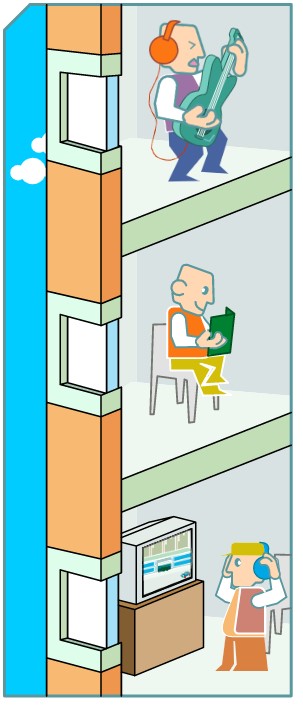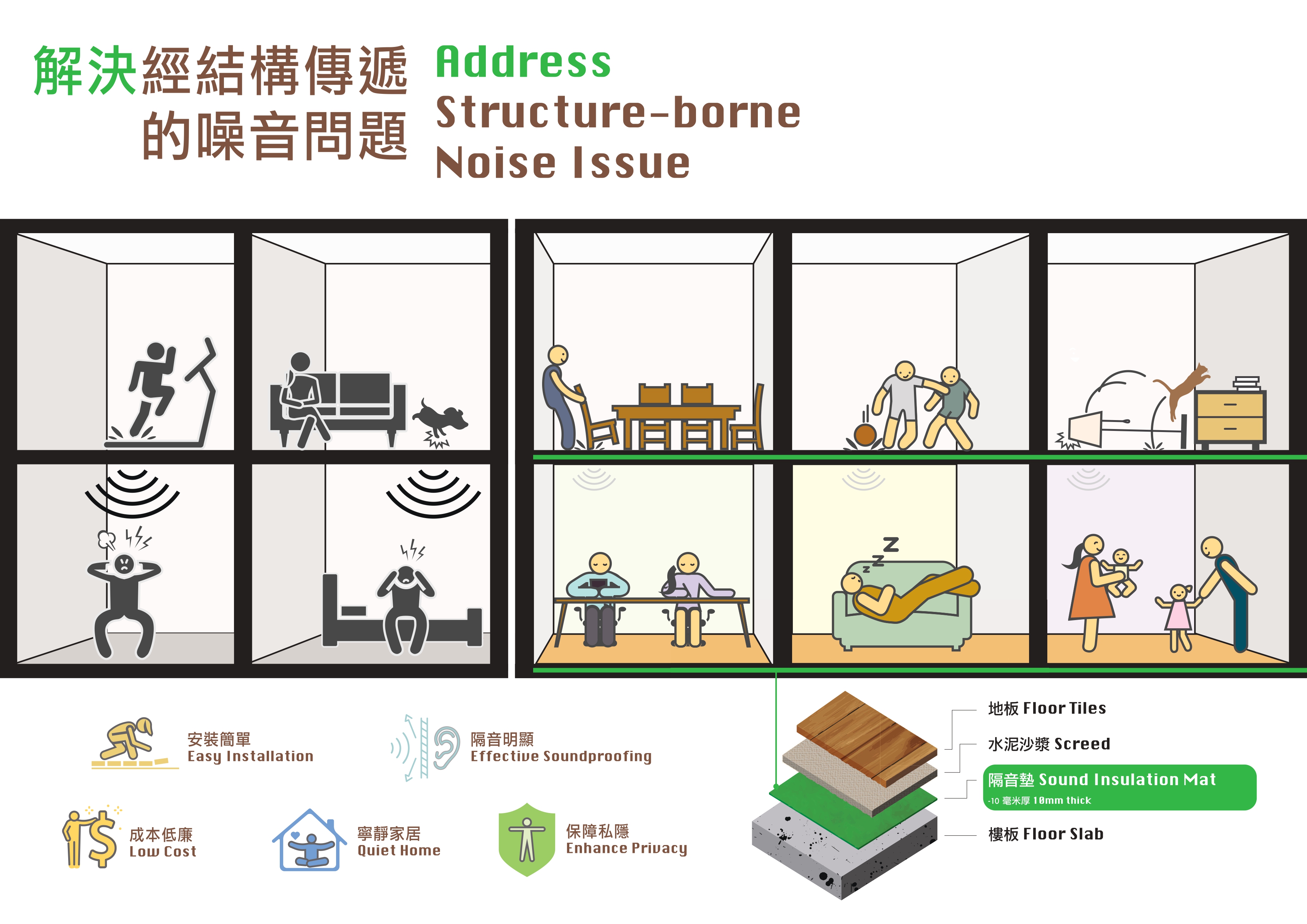Noise from Domestic Premises and Public Places
Noise from domestic premises or public places includes noise which is produced in domestic premises by sources such as television sets, air-conditioners or dogs, and noise produced in public places by sources such as radios, shops/hawkers or loudspeakers. This type of noise is commonly described as neighbourhood noise.
The following are some examples of noise from domestic premises and public places:
 |
 |
 |
 |
 |
The Noise Control Ordinance (NCO) deals with noise from domestic premises and public places.
Section 4 of the Ordinance is a general provision to control noise of this nature, which causes annoyance to any person at night (i.e. 11 p.m. to 7 a.m.) or on a general holiday.
Section 5 of the Ordinance provides control over particular noise sources (in domestic premises or public places) at any time of the day or night. These noise sources include animals and birds, musical instruments, loudspeakers, games, trades or businesses and air-conditioners.
It should be noted that the term 'domestic premises' applies to individual dwellings or household units and not to an entire building which may have mixed commercial and residential uses or even industrial activities on lower floors. Noise from the non-residential parts of such buildings is controlled under section 13 of the Ordinance.
The nature of the noise sources covered by these provisions in sections 4 and 5 of the Ordinance is such that it is not possible to specify fixed acceptable noise levels or noise measurement procedures to be used in assessing the acceptability of the noise. As is the case in other places or cities, noise from domestic premises and public places is to be responsively dealt with by the police on a 'reasonable man' approach to determine whether the noise of concern causes annoyance.
What can you do to help reducing noise from domestic premises?
You should be considerate to your neighbours. Measures that can be taken to avoid causing noise disturbance to the neighbours includes:
Application of Sound Insulation in Residential Buildings
Noise from normal day-to-day activities in domestic premises, if without appropriate mitigation measures, may transmit from one unit to another via walls or floor slabs, causing nuisance to neighbours.
Solely relying on structural reinforced concrete floor slabs would unlikely be able to provide the necessary impact sound insulation, we therefore recommend, when constructing new residential developments or renovating existing domestic premises, installing resilient flooring system which is usually a mat made of recycled rubber or equivalent environmentally friendly materials, on the floor slab to prevent impact noise generated from day-to-day activities. This could enhance the occupants' privacy and also allow normal day-to-day activities without causing significant noise nuisance to neighbours downstairs.
|
|
More technical details can be found in the "Practice Note on Application of Sound Insulation in Residential Buildings to Reduce Noise Transmission Between Units". You may contact your renovation contractors for the details on installing sound insulation mat.
Practical Tips for Minimizing the Nuisance
Pet Nuisance

- As owners of pets such as dogs, birds and cats, you must prevent them from causing any noise nuisance to your neighbours.
- Do not let your dog bark or whine or leave it alone for long periods.
Musical Noise

- Keep the volume as low as possible, especially late at night. Use headphones or listen to music on a personal stereo.
- When not using headphones or earpiece, set the bass control at a low level as the "bass beat" can be particularly irritating.
- If you play a musical instrument, avoid practice early in the morning or during the late evening/night.
- If the instrument has an amplifier, turn the volume down or preferably use personal headphones.
Others





- Avoid producing noise from moving tables and chairs by adhering soft pads/caps underneath furniture’s legs. Do not move furniture during evening and at night.
- Use soft yoga mat or carpet when exercising or playing games or with toys.
- If you are playing outside such as in common parts of the buildings, ensure you do not create noise disturbance, especially by yelling and engaging in noisy pastimes.
- Maintain your electrical appliances (for example air-conditioners) in good working condition to avoid causing noise nuisance to your neighbours.
What to do when affected by neighbourhood noise?
If you find the noise unbearable, you could first bring the matter to the attention of the property management agents/companies who can usually resolve the situation directly by liaising with the parties involved. If difficulties are encountered in solving the problem, you can call the local police station for immediate follow-up and necessary enforcement action. The enforcement work against such noise is mainly carried out by the Police. Upon receipt of the relevant noise complaints, the EPD will approach the complainants to understand the situation, explain the regulatory arrangements of the NCO to them, and refer the cases to the Police for follow-up enforcement as appropriate.
To facilitate the property management agents/companies to handle domestic noise complaints, the following leaflets have been prepared with a view to helping complainants as well as property management personnel to document the case details for further following up by the enforcement personnel.
Tips for Domestic Noise Complaint (For Residents)
Tips for Domestic Noise Complaint (For Property Management Company)

